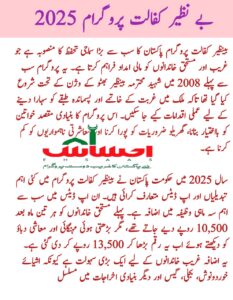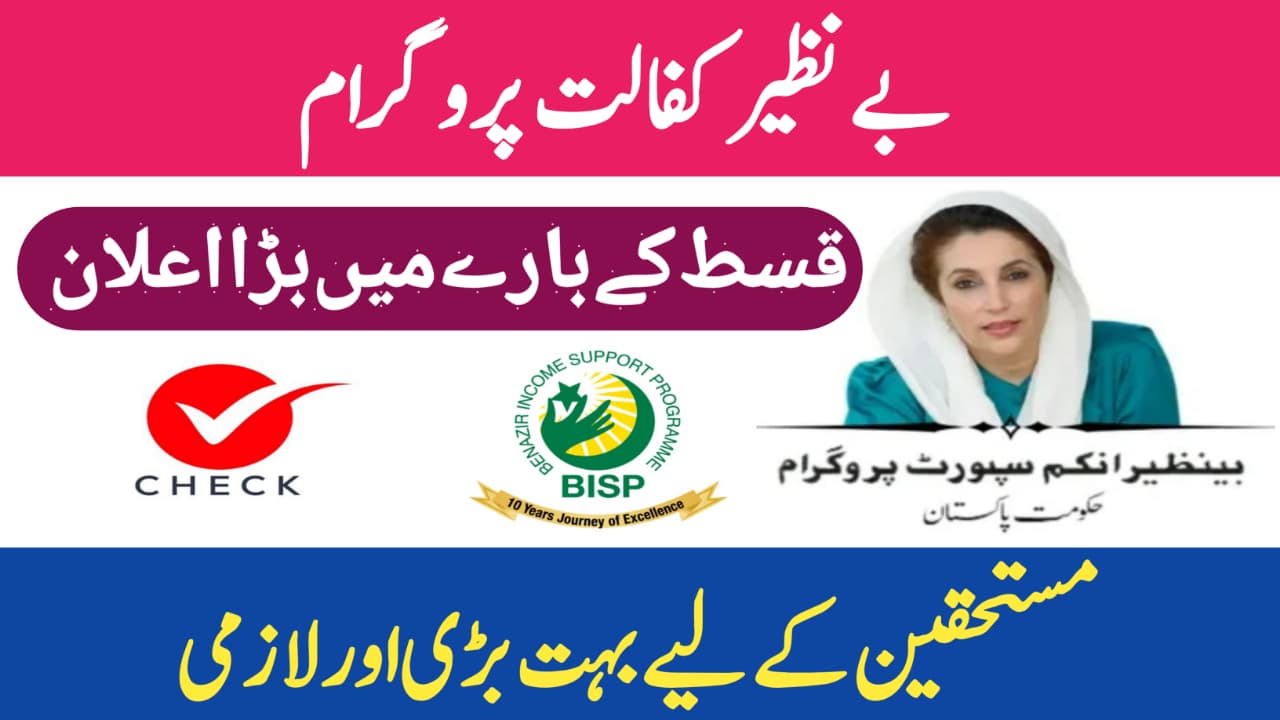The Benazir Kafalat Program (BKP) is one of the largest social protection initiatives in Pakistan, designed to provide direct financial assistance to low-income families. Managed under the Benazir Income Support Programme (BISP), this scheme aims to reduce poverty, ensure food security, and empower women by providing unconditional cash transfers.
As we step into 2025, several important new updates have been introduced in the Benazir Kafalat Program, including an increase in quarterly stipends, the introduction of the Integrated Grievance Management System (iGMS), and improved methods for digital payments. This article provides a complete guide to the latest developments, eligibility criteria, registration process, payment methods, and how beneficiaries can benefit from the program.
Background of the Benazir Kafalat Program
The Benazir Kafalat Program was first launched in 2008 as part of BISP’s poverty reduction strategy. It was named after Shaheed Benazir Bhutto, the former Prime Minister of Pakistan, to honor her vision of social justice and support for vulnerable groups.
Over the years, the program has expanded across Pakistan, reaching millions of families with quarterly financial aid. The program especially focuses on:
- Widows, orphans, and women-led households
- Families with low or no income
- Households affected by inflation, unemployment, or natural disasters
Benazir Kafalat Program 2025 – New Updates
In 2025, the Pakistani government announced major improvements to the program. Let’s explore these changes in detail.
1. Increase in Quarterly Stipend
One of the most significant updates is the increase in cash transfers.
- Previously: Rs. 10,500 per quarter
- Now: Rs. 13,500 per quarter
This step has been taken to provide relief to poor families struggling with inflation, rising fuel prices, and food shortages. The increase will help families manage essential household expenses like groceries, healthcare, and children’s education.
2. Expansion of Beneficiaries
By the end of 2025, the program aims to reach 10 million households. This expansion ensures that new families who were previously not included due to survey errors, outdated CNICs, or lack of information can now reapply and benefit.
3. Integrated Grievance Management System (iGMS)
With the support of the Asian Development Bank (ADB), the government has launched the iGMS platform, which allows beneficiaries to:
- File complaints online
- Track application status
- Report non-payment issues
- Update CNIC or household details
This system ensures greater transparency, accountability, and faster problem resolution.
4. Digital Wallet Payments
The program is gradually moving towards a digital disbursement system. Eligible beneficiaries can now receive payments through:
- Easypaisa
- JazzCash
- Bank accounts (selected banks)
This ensures convenience and safety and reduces long queues at payment centers.
5. Mobile Registration Vans
To reach people in remote and rural areas, mobile vans have been deployed for registration and awareness campaigns. These vans visit villages and towns, making it easier for families to enroll without traveling to urban centers.

Benazir Kafalat Program Eligibility Criteria for 2025
Not every household qualifies for the Benazir Kafalat Program. The government uses the National Socio-Economic Registry (NSER) survey to determine eligibility. In 2025, the following criteria apply:
- Female CNIC Holder: The program targets women as primary recipients.
- Household Income: Families earning less than Rs. 30,000 per month are considered.
- Widows and Orphans: Automatically eligible if registered.
- Disabled Persons: Special preference is given to households with disabled members.
- No Government Employees: Families with government employees or high taxpayers are excluded.
- Poverty Score: Must fall within the BISP-defined poverty threshold.
How to Check Eligibility (2025)
Beneficiaries can easily check their eligibility status through the following methods:
-
8171 SMS Service
- Send your CNIC number to 8171.
- You will receive an SMS confirming eligibility or rejection.
-
8171 Online Portal
- Visit the official portal: 8171.bisp.gov.pk
- Enter your CNIC number and captcha code.
- The portal will display your eligibility status.
-
BISP Registration Centers
-
Visit the nearest registration center with your CNIC.
-
Staff will guide you through the verification process.
-
How to Apply for the Benazir Kafalat Program 2025
The application process has been made simpler and more transparent. Here’s how you can apply:
-
Visit the NSER Survey Office or Mobile Van
Provide your household details, CNIC, and income information. -
Submit Required Documents
- CNIC of the female head of household
- Birth certificates of children (if applicable)
- Disability certificate (if any)
-
Verification Process
BISP will cross-check your details through NADRA and NSER databases. -
Confirmation
Once approved, you will receive an SMS confirmation from 8171.
Payment Process in 2025
Payments are disbursed quarterly through the following methods:
- ATMs of Partner Banks
- Easypaisa / JazzCash (selected beneficiaries)
- Designated Payment Centers
- Mobile Vans in Remote Areas
Beneficiaries should bring their original CNIC to receive cash payments.
Common Issues and Solutions
-
CNIC Blocked or Expired
- Renew your CNIC from NADRA before reapplying.
-
Biometric Verification Failed
- Try another bank branch or register a complaint via iGMS.
-
Not Receiving Payment
- Check your status via the 8171 portal.
- Complain to iGMS.
-
Disqualification
- If your income has increased or you no longer meet the criteria, your name may be removed.
Impact of the Benazir Kafalat Program
The program has significantly improved the lives of millions of Pakistani families:
- Women’s Empowerment: Direct payments to women ensure financial independence.
- Education Support: Families can afford school fees and supplies.
- Healthcare Access: Extra funds allow better access to medicines and treatment.
- Poverty Reduction: Reduces reliance on loans and informal borrowing.
Future Plans of BISP
The government aims to further strengthen the program by:
- Expanding digital payments nationwide
- Introducing conditional cash transfers linked to health and education
- Ensuring zero corruption and transparency through technology
- Increasing stipends further if inflation rises
Conclusion
The Benazir Kafalat Program 2025 continues to be a lifeline for millions of Pakistani families. With the increase in stipends, the introduction of digital wallets, and a transparent grievance system, the program is becoming more effective and people-friendly. Families are encouraged to keep their CNICs updated, check eligibility through 8171, and make use of new digital facilities to receive their payments conveniently.
For More Information Click Here
